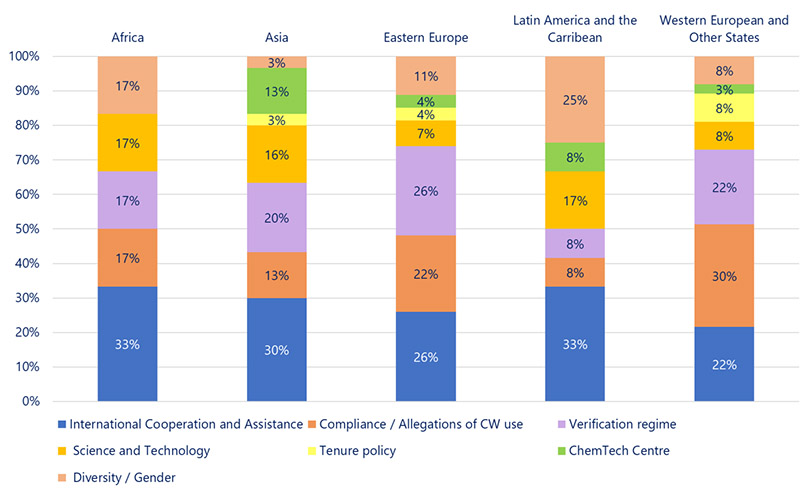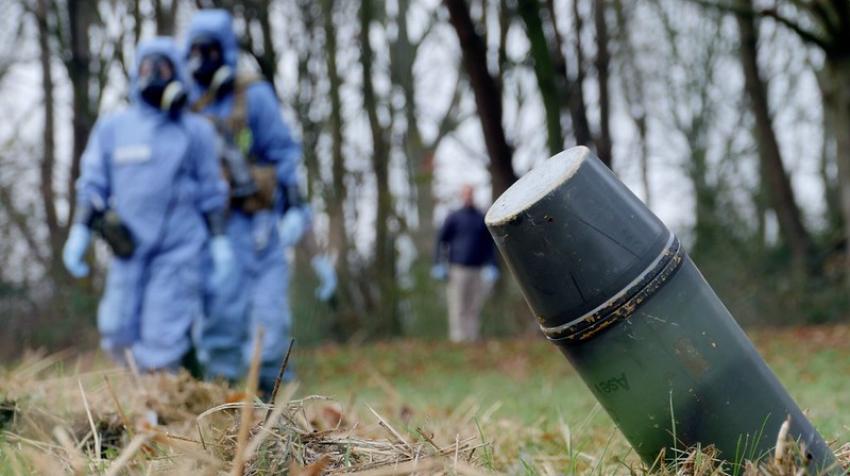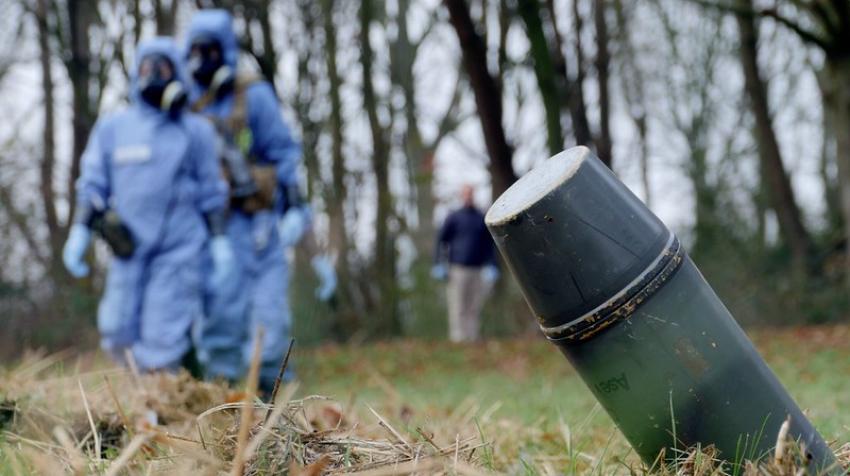28 April 2023
Chemical weapons have been used on multiple occasions throughout modern history, in some cases with horrific effects. The 1993 Chemical Weapons Convention (CWC) sought to bring an end to the horrors of the hostile use of chemistry and “exclude completely the possibility of the use of chemical weapons” for all time.
The CWC has largely worked well, navigating the challenges of advancing a complex treaty through infancy. However, the last decade has proven challenging for the CWC and those that tend to the regime in the Organisation for the Prohibition of Chemical Weapons (OPCW). The use of chemical weapons in Iraq, Syria, Malaysia, and the United Kingdom has shattered the assumption that chemical weapons had become an outmoded relic of the past. The Syrian case has proven particularly divisive, resulting in the development of new tools to find-facts and apportion responsibility for the use of chemical weapons.
Despite these challenges, the treaty continues to embody a strong set of norms. Indeed, no State Party would admit to the development or use of chemical weapons, and when faced with allegations of association with the development or use of chemical weapons, States go to great lengths to contest such allegations. Moreover, the CWC industry verification regime makes chemical weapons development much more difficult to undertake.
CWC Review Conference
The Fifth CWC Review Conference will take place from 15 to 19 May 2023. The Conference presents an important opportunity to determine the strategic direction of treaty implementation for the next five years. As we discuss in our report on Preparing for Success at the Fifth Review Conference of the Chemical Weapons Convention, there will be much to consider as both the CWC and the scientific and security context in which it is located continue to evolve. It is also clear from (albeit non-statistically significant) polling data from a series of regional briefings organised by UNIDIR that States Parties have different priorities for the Review Conference (see Figure 1, below).

Figure 1. Regional priorities based on polling of participants in UNIDIR regional briefings on the CWC.
Science and technology
In terms of science and technology of relevance to the CWC, several developments present potential challenges to the chemical weapons prohibition regime. For example, as the latest OPCW Scientific Advisory Board (SAB) report on Developments in Science and Technology notes, the convergence of chemistry with AI could enable aspiring weaponeers to identify new potential chemical warfare agents or identify routes to synthesising classic agents that are able to circumvent existing export control regimes.
Advances in science and technology present risks as well as exciting opportunities, including the potential to strengthen CWC implementation. As the SAB report further states, sampling techniques have emerged that could augment investigations, new forms of satellite or drone surveillance can help bolster the verification toolkit, and new means of sensing agents could help alert actors to the presence of toxic chemicals.
Evolving security context
In parallel with scientific change, the security context has also evolved over the last five years since the last Review Conference in 2018. The geostrategic tension that followed the invasion of Ukraine in March 2022 is likely to sour the negotiating environment and complicate achieving consensus. This was certainly the case at both the Review Conferences of the Treaty on the Non-Proliferation of Nuclear Weapons (NPT) and Biological Weapons Convention (BWC) last year. The former collapsed, while the latter achieved modest success.
More germane to the CWC context is that these wider tensions are likely to compound existing difficulties relating to the use of chemical weapons in Syria. Since 2018, the newly established Investigation and Identification Team (IIT) has produced three reports addressing chemical weapons use in three areas in Syria: Ltamenah, Saraqib and Douma. These reports attributed the use of chemical weapons to the Syrian regime, which has yet to fully resolve outstanding issues with the accuracy and completeness of its declaration on chemical weapons.
Syria and its allies have questioned the legitimacy of the IIT and criticised its reports. With little sign of this issue being resolved, it may once again scupper efforts towards a substantive consensus outcome from the Fifth CWC Review Conference.

“The threat posed by chemical terrorism and non-State actors using chemical weapons remains salient.” (© OPCW, 2022)
The need for strategic direction
In the event the CWC Review Conference collapses, the norm against the use of chemical weapons will most likely remain intact and the OPCW will continue to function. However, States will miss an important opportunity to chart the strategic direction of the CWC over the next five years. And strategic guidance is urgently needed. 2023 should see the completion of the verified destruction of declared chemical weapons stockpiles. This has been a longstanding OPCW activity, the completion of which is a major achievement. However, the completion of this work will entail a rebalancing of OPCW priorities and tasks. This demands the attention of States Parties.
The wider CWC verification regime also requires consideration to ensure this remains fit for purpose in a changing scientific, technological, industrial, and political environment. Otherwise, new threat scenarios, such as smaller footprint chemical weapon capabilities, may slip through the net.
Moreover, the threat posed by chemical terrorism and non-State actors using chemical weapons remains salient. The safety and security of chemical industry is an important focus, as the use of chemical weapons by terrorists may be opportunistic and crude. States Parties will need to consider how to further strengthen the OPCW’s contribution to global anti-terror efforts through national implementation, and assistance and protection activities and capacity building with key stakeholders.
Other organisational issues could also benefit from strategic guidance at the review conference. For example, gender and diversity are increasingly important considerations in disarmament agreements, including the CWC, and may require further consideration.
Moving forward
Ideally, CWC States Parties would be able to agree a substantive outcome document that addresses these issues and strategically advances the regime by consensus. Moreover, as the BWC has demonstrated, consensus is possible under difficult circumstances. However, a substantive consensus outcome would likely require overcoming longstanding division on some key topics that blighted success in the Fourth CWC Review Conference five years ago.
As this appears unlikely, States Parties may want to develop a “Plan B”, potentially through identifying bounded areas where consensus decisions might be achieved to provide the needed strategic guidance for States Parties, the OPCW policymaking organs, and the Secretariat after the Review Conference.
James Revill is Head of the WMD and Space Security Programmes at UNIDIR. Alexander Ghionis is a Research Fellow in Chemical and Biological Security at the Harvard Sussex Program, based in the Science Policy Research Unit, University of Sussex, UK. Alexander Kelle is a Senior Researcher at the Berlin Office of the Institute for Peace Research and Security Policy at the University of Hamburg (IFSH), Germany. María Garzón Maceda is an Associate Researcher for the WMD and Space Security Programmes at UNIDIR.

